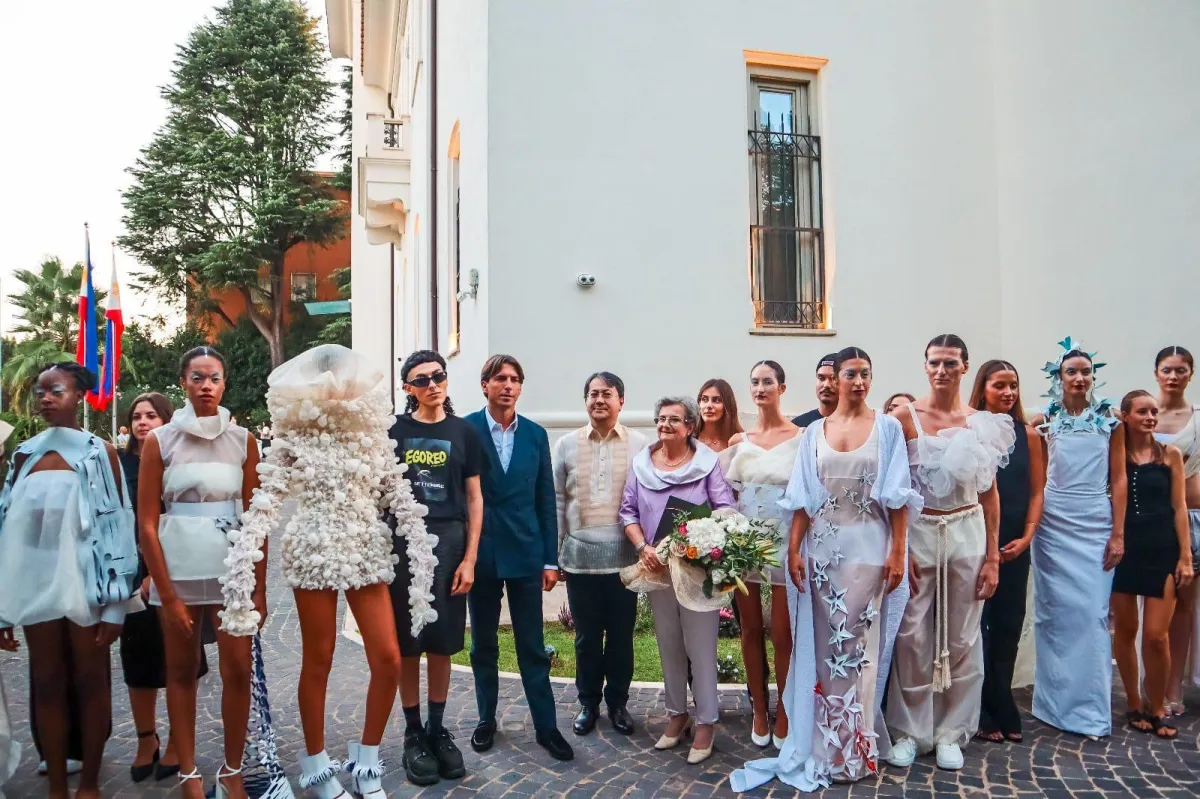
Bianchi Contaminati: Philippine Textiles Reimagined Through Italian Design In Rome
ROME, Italy—The Philippine Embassy in Rome, in collaboration with Maiani Accademia Moda (MAM), proudly presented the Bianchi Contaminati fashion show, 04 September 2025, a landmark event that reimagined the Philippines’ rich textile heritage through the lens of contemporary Italian haute couture.
The event marked the culmination of a two-year partnership between the Embassy and MAM, which showcased 44 original creations by 20 MAM students. Using fabrics such as piña, piña silk, piña jusi, jusi, cotton abaca, and cotton hablon donated by the Embassy, Aklan Provincial Government, Philippine Fiber Industry Development Authority (PhilFIDA),Trade and Investment Center-Paris, and the Philippine Department of Education (DepEd), the young designers combined traditional Filipino weaving techniques with modern Italian fashion aesthetics, resulting to a collection highlighting the fabrics’ versatility, sustainability, competitiveness and relevance globally.
In his remarks, Philippine Ambassador to Italy Neal Imperial highlighted the cultural significance of the showcase, describing it as “more than a display of garments—it is a tapestry woven with threads of history and culture.” He further remarked, “The fashion show represents a moment where heritage and tradition meet innovation and modernism, and where the artistry of Filipino weavers meets the future of global fashion.”

IN PHOTO: Ambassador Neal Imperial and Mrs. Maria Maiani, founder and Director of Maiani Accademia Moda
Mrs. Maria Maiani, founder of MAM, offered the fashion show in honor of Giorgio Armani, Italy’s fashion icon who passed away that day. She further highlighted that the collaboration demonstrated how the Embassy, “...believed in [MAM’s] students and created a fusion between the two countries— the Philippines with its loom-handcrafted Piña fabric (recognized by UNESCO as an Intangible Cultural Heritage), and our Made in Italy products. This gave the students the opportunity to develop creative processes around the theme ‘Bianchi Contaminati’ and resulted in a vibrant collection showcasing our Made in Italy products.”
Attended by 200 members of the diplomatic corps, officials from the municipality of Rome, fashion industry stakeholders and media, this initiative demonstrated the Embassy’s commitment to the advancement of Philippine creative industries, especially the promotion of indigenous natural fabrics. By showcasing Philippine fabrics within the Italian fashion scene, the project fosters cross-cultural collaboration that exudes creativity and character of both Philippine weavers and culture bearers and the emerging Italian designers, promotes sustainable and ethical sourcing practices, and creates new opportunities for Filipino artisans and producers.

The Philippine textile and garment industries are vital drivers of the country’s economic growth, cultural identity and sustainable development. Valued at USD 58.7 million with a 3.65% annual growth rate,[1] the sector provides livelihood, particularly to women, indigenous weaving and marginalized communities. As one of the oldest industries in the country, it continues to thrive in the Cut-Make-Trim Segment supported by ultra-cost efficiencies, revitalized garments and textile ecosystem, strong cluster dynamics, deep talent pool, and good connectivity for export in Asia, North America, and Europe. Government support, innovation and rising global demand for sustainable fashion further strengthen the industry’s international footprint, with Italy identified as a priority market.

At the regional level, the Philippines is advancing negotiations for a Philippines-European Union (EU) Free Trade Agreement, which is expected to make the industry more attractive to foreign investors, including mid-luxury brands seeking sustainable and high-quality fabrics. Industry associations also play a key role in ensuring that local producers remain competitive and aligned with global trends.

The Philippines is home to some of the most unique and eco-friendly fibers such as abaca, sinamay, buri, piña and jusi, crafted into textiles through centuries-old weaving traditions. Each design, pattern and motif carries the story of a community, reflecting its local identity, natural materials and cultural symbolism. By blending these timeless fabrics with modern fashion, the Bianchi Contaminati fashion show underscored the Philippines’ role as both a custodian of cultural heritage and a potential partner in the global fashion industry.

Philippine Embassy in Rome, Italy News Release
Photos courtesy: Philippine Embassy in Rome Italy

